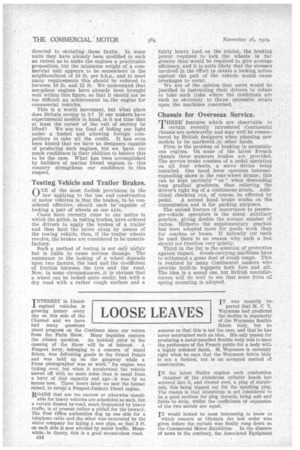Testing Vehicle and Trailer Brakes.
Page 52

If you've noticed an error in this article please click here to report it so we can fix it.
ONE of the most foolish provisions in the law applying to the use and construction of motor vehicles is that the brakes, to be considered effective, should each be 'capable of locking a pair of wheels on one axle.
Cases have recently come to our notice in which the police, in testing brakes, have ordered the drivers to apply the brakes of a trailer and then haul the latter along by means of the towing vehicle, then, if the trailer wheels revolve, the brakes are considered to be unsatisfactory. Such a method of testing is not only unfair but is liable to cause serious damage. The resistance to the locking of a wheel depends upon two factors, the load and the co-efficient of friction between the tyre and the road. Now, in some circumstances, It is obvious that a wheel can be locked quite easily, but with a dry road with a rather rough surface and a fairly heavy load on the trailer,. the braking power required to lock the wheels is far greater than would be required to give average efficiency, and it is quite likely that the stresses involved in the effort to obtain a locking action against the pull of the vehicle would cause breakages to occur.
We are of the . opinion that users would be justified in instructing their drivers -to refuse to take such risks where the conditions are such as obviously to throw excessive strain 111304 the machines coneertied.




























































































































